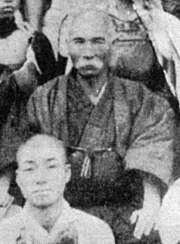Karate history lesson

Kenwa Mabuni
Last May, Jacob and I started taking Karate lessons. Jacob met our sensei Kevin Gurganus during recess at Little River School, where Kevin teaches special ed classes. Due to his work in the public schools, sensei Kevin reaches many children who can really benefit from the Karate lessons. With his hard work and his talent for working with kids sensei Kevin has built an excellent reputation for his dojo in this area, and beyond.
He also teaches Kobudo (traditional Okinawan weapons) at a very high level, but here I want ot focus on Karate.
Jacob brought home a brochure, and so I took him for trial lessons, and ended up signing us both up. I figured that it’ll be a good father-son thing to do together, and in case he really gets good at it, it won’t be too easy for him to kick my butt in a few years.
Last week I got my first color belt (yellow – 10th kyu) which is the first step in the long process of mastering this fascinating art/sport. Over the weekend I did a bit of reading about the history of Karate, and my sensei’s Karate “lineage.”
Sensei Gurganus teaches Shito-ryu Karate-do, a style of Karate created by Kenwa Mabuni:
Kenwa Mabuni (1889-1953) had studied Shuri Te under [Anko] Itosu (1830-1915) who was at the time over seventy years old. Mabuni also studied White Crane Chaun Fa under a tea merchant from the Fukien province of China called Wu Xiangui, known by the Okinawan name of Gokenki (1886-1940), and Naha Te from Kanryo Higaonna, the teacher of Goju Ryu’s founder Chojun Miyagi.
In 1929 Kenwa Mabuni moved to Osaka in mainland Japan where he taught his system of Karate known as Shito Ryu which combines the characters from the names of his two teachers Kanryo Higashionna and Itosu. Thus combining the Shuri ti with the Naha ti systems.
The Japanese Tradition of Motobu Ha Shito Ryu combines the teachings of Kenwa Mabuni’s Shito Ryu Kempo with those of Choki Motobu’s Okinawan Kempo Tode Jutsu. Choki Motobu arrived in Osaka in 1921 and Kenwa Mabuni in 1929 both of who taught Kosei Kuniba, who was later to become the Japanese Motobu Ha Shito Ryu systems second generation headmaster and established the Seishan Kan Dojo in Osaka. The son of Yukimori son, Siyogo Kuniba became the third generation headmaster of the style which became known as Motobu Ha Shito Ryu Seishin Kan., Siyogo Kuniba also received training from Shojo Nagamine (b.1907).
Soke Siyogo Kuniba, 10th Dan, trained Soke Richard Baillargeon, 8th Dan, the founder and first Director of the National Karate and Jiu-Jitsu Union (NKJU), and his successor, Kyoshi Tola Lewis, 9th Dan, in the Motobu Ha Shito Ryu style of Karate, for which he was the soke – the head sensei.
Sensei Gurganus, 6th Dan, is a direct student of Kyoshi Lewis, and that means he is only two sensei removed from Master Kenwa Mabuni, one of the key figures in Karate history.
I really enjoy sensei Kevin’s lessons, and I really appreciate his attention to detail and profound knowledge of the art. And understanding the pedigree of his training has increased my respect and appreciation for his lessons even more.
Here are some of the key masters in this lineage:

Anko Itosu
Sensei to Kenwa Mabuni

Higaonna_Kanryo
Sensei to Kenwa Mabuni
Contemporary of Kenwa Mabuni
Student of Sensei Matsumora of Tomari
Shodai Soke (founder) of Motobu-Ha Karate Do

Soke Shogo (or Siyogo) Kuniba
Sandai Soke of Motobu Ha Karate Do
Shodai Soke of Kuniba Ryu Goshin Do
Shodai Soke Kuniba Ryu Kobudo
Shodai Soke Kuniba Ryu Iaido
Student of Kenwa Mabuni
Founder of NKJU, student of Soke Kuniba


March 15th, 2010 at 10:20 am
I had the opportunity to meet soke Baillargeon several times when I studies under Soke Riedner in the late 60’s and early 70’s. I have always been impressed by this focused approache and determination to bring real martial arts to the United States.
Max Andrews Kyudan, Niho Kempo Jujtsu Ryu